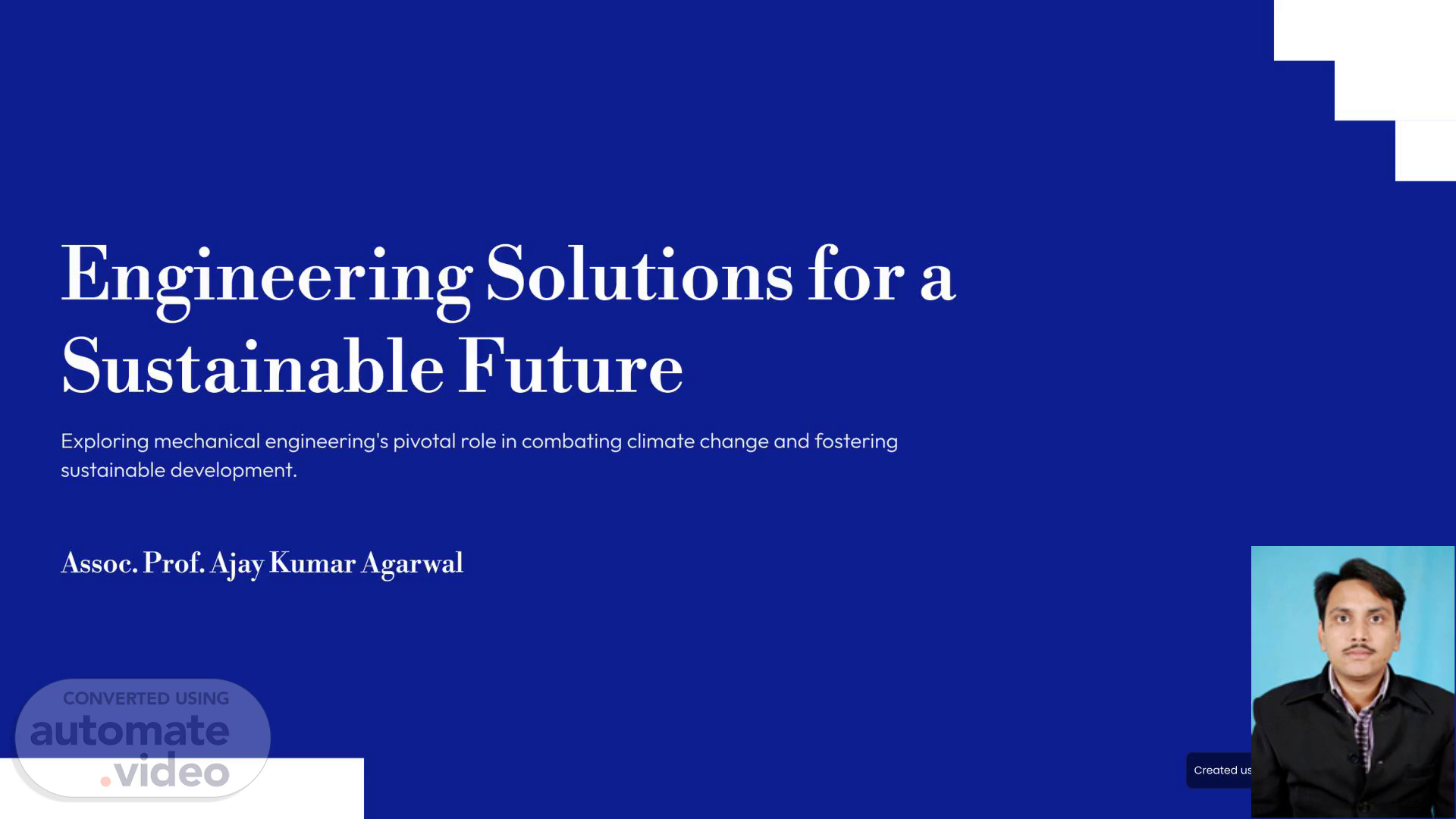
Addressing Climate Change and Environmental Degradation_ The Role of Mechanical Engineering in Sustainable Development Goals (2)
Scene 1 (0s)
[Audio] Mechanical engineering has long been recognized as a crucial discipline in addressing global challenges, particularly in the context of climate change and sustainable development. As we navigate this critical juncture, it becomes increasingly imperative to explore the intersection of engineering and environmental sustainability. This presentation will delve into the pivotal role mechanical engineering can play in combating climate change and fostering sustainable development..
Scene 3 (36s)
[Audio] Climate change and environmental degradation pose significant threats to human life, ecosystems, economies, and communities worldwide. The United Nations' Sustainable Development Goal 13 emphasizes the urgent need to combat climate change and its devastating effects. To achieve this goal, we require multifaceted solutions that integrate advances from various fields. Mechanical engineering plays a crucial role in developing technologies that enhance energy efficiency, reduce emissions, and promote sustainable practices across industries. This essay will explore the significant contributions mechanical engineering research can make to sustainability, addressing the urgent challenges posed by climate change and environmental degradation..
Scene 4 (1m 24s)
[Audio] Global temperatures have risen significantly over the past century, with alarming consequences. The Intergovernmental Panel on Climate Change reports that this rise has triggered a range of negative environmental effects, including extreme weather events, rising sea levels, and loss of biodiversity. Human activities, particularly fossil fuel consumption and deforestation, are primarily responsible for driving climate change, resulting in increased greenhouse gas emissions that alter the Earth's climate systems. Environmental degradation manifests in the depletion of natural resources, pollution, and habitat loss, further complicating efforts to address climate change effectively. To combat these environmental challenges, innovative research in mechanical engineering is necessary, integrating across disciplines to spearhead sustainable development initiatives..
Scene 7 (2m 31s)
[Audio] In conclusion, harnessing engineering for a sustainable future necessitates a comprehensive approach that incorporates diverse fields of research and innovation. Mechanical engineering plays a pivotal role in advancing key areas like renewable energy, waste management, water purification, and transportation systems, which are indispensable for sustainable development. To achieve this objective, prioritizing research and collaboration among engineers, scientists, and policymakers is imperative. This collaborative endeavor will enable us to devise effective solutions addressing the consequences of climate change and promoting sustainability. As we utilize the capabilities of mechanical engineering to develop innovative solutions, we can guarantee a healthier planet for future generations..
Scene 8 (3m 23s)
[Audio] As we wrap up our discussion on 'Engineering Solutions for a Sustainable Future', we would like to leave you with a compilation of essential academic references that have been integral in shaping our understanding of this topic. Our list begins with a study conducted by Böhringer, Carbone, and Rutherford in 2017, which examines the role of renewable energy in achieving climate goals. Their model-based analysis highlights the significance of energy transition strategies in policy-making. Next, we have a paper by Demirbas in 2004, which explores waste management and waste-to-energy conversion technologies. It emphasizes the environmental impacts of these practices and the necessity for sustainable solutions. Furthermore, an article by Ghaffour, Lattemann, and Missimer in 2013 investigates the technical and economic feasibility of renewable energy-powered desalination plants. This is crucial in addressing water scarcity issues and finding potential solutions. Additionally, Kaldellis and Zafirakis' 2007 publication provides a concise overview of wind energy evolution, serving as a guide for engineers and policymakers involved in renewable energy projects. Moreover, Mann and Duffy's study in 2020 focuses on waste management practices and their effects on climate change. They stress the importance of improving waste strategies to mitigate environmental impacts. The concept of a'safe operating space for humanity' is introduced by Rockström, Steffen, Noone, et al. in 2009. This highlights the boundaries we must abide by for sustainable development. Sullivan and colleagues' 2020 overview of global transportation trends and emissions sheds light on the challenges and opportunities for reducing carbon footprints. Thompson and colleagues' 2017 paper discusses lightweighting in automotive applications, presenting current practices and potential advancements to enhance fuel efficiency and reduce emissions. Finally, Zhang et al.'s 2021 review of the application of artificial intelligence in waste management showcases innovative solutions to improve efficiency and effectiveness in recycling and waste processing. With that, we conclude our presentation. We hope you have gained valuable insights into the role of mechanical engineering in combating climate change and promoting sustainable development..